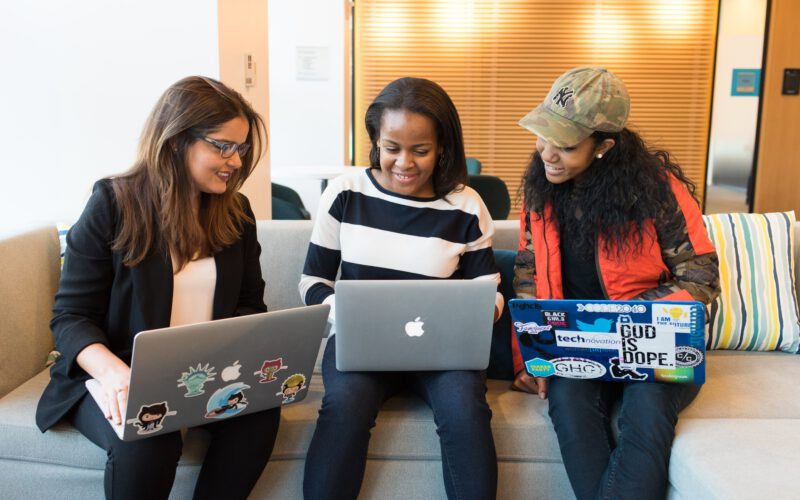Female entrepreneurship is on the rise in Latin America, according to a recent report by the IDB Lab. These women are focusing on industries and business models that have the potential to change the region for the better. Women in fintech, biotech, and edtech in Latin America have been particularly successful, leading some of the region’s largest startups from Brazil, Mexico, Chile, Colombia, and Costa Rica.
The new study, “wX Insights 2020: The Rise of Women STEMpreneurs,” highlights women who are innovating in STEM fields (Science, Technology, Engineering, and Math), which are traditionally male-dominated in Latin America and worldwide.
The report, while largely optimistic about the growing support for female founders in Latin America, notes that almost 60% of women lack the funding they need to scale their startups. This trend is common across the region, but perhaps even more challenging for female entrepreneurs who often face all-male investor teams during a pitch.
Yet female founders have also helped raise millions of dollars for companies in Latin America’s trickiest industries; the women interviewed in the report were concentrated in edtech, healthtech, and fintech.
Here is a deeper dive into each of the industries where female founders are on the rise in Latin America.
1. Edtech
15% of female founders in Latin America describe their business as edtech, bringing technology to Latin America’s educational system. Edtech startups receive just 2% of capital across Latin America; however, female founders are dominating the industry in the region.
For example, Chile’s Komal Dadlani, co-founder and CEO of Lab4U, scaled her business across Chile, Mexico, and the US, reaching over 100,000 high school students with a smartphone app that simulates a science lab to make STEM learning fun. An IDB case study in 2019 found that Lab4U not only increased student test scores in physics but also students’ confidence in their knowledge.
Similarly, Seven Generation Games, founded by AnnMaria de Mars, is working to provide video games through low-cost tablets that teach students English, Spanish, and mathematical skills. The bilingual games use indigenous stories to teach students in Chile and the US and can be used without the Internet on very simple devices, making them accessible for small, rural schools in Latin America.
In the same vein, Nastassja Palmiotto, co-founder of PleiQ, is building smart children’s toys that combine physical objects with augmented reality to provide a more educational playing experience. PleiQ uses a smartphone to connect with the toys through an app that helps young children learn as they play.
Marta Forero, the co-founder of UBits, an online corporate education startup from Colombia, was the only Latin American female founder in her YCombinator cohort. UBits has scaled rapidly across Colombia, Mexico, Chile, and Peru after receiving funding from Silicon Valley investor, Spectrum 28. UBits already has over 50,000 students from 70 corporate clients, which include many of Latin America’s largest companies.
2. Healthtech
Healthtech and biotech tend to be incredibly challenging industries due to the level of regulation that startups must comply with before bringing a product to market. Yet in Latin America, patients often wait days or even weeks to receive medical care, placing urgency on biotech solutions that can make healthcare more efficient.
Over 10% of female entrepreneurs in Latin America are innovating in this field, developing solutions that are improving blood test results and fighting infections, to name a few. Mexican startup Unima, founded by Laura Mendoza, is working to create at-home blood tests that can be processed through smartphone pictures sent to doctors, shortening lines at hospitals for routine tests.
Unima participated in YCombinator in 2016 and has since received over $2M in funding to continue improving the accuracy of its tests. Laura Mendoza was also the winner of the 2018 WeXchange pitch competition for female entrepreneurs in STEM.
Nextbiotics is another startup disrupting the global antibiotics market with a unique solution that uses engineered viruses to fight infection. Founded by Costa Rican/Mexican team, Maricel Saenz, Jorge Bardales, and Angie Carrillo, Nextbiotics focuses on fighting a “big problem” that affects the entire world: antibiotic resistance.
3. Fintech
Fintech startups still receive a majority of Latin America’s investment dollars, making up over 25% of deals in 2019. Over 35% of Latin America’s fintechs have female founders, the highest percentage in the world at 5x the global average. Financial inclusion is one of Latin America’s most pressing problems and local female entrepreneurs are taking enormous steps to solve it.
Brazil’s Cristina Junqueira, for example, leads the world’s largest and most popular neobank, Nubank, which recently reached over 15 million clients across Mexico and Brazil. Nubank is worth over $10B after several investments from Tencent, Sequoia, and other global investors. The mobile credit card offers branchless services to millions of Brazilians who struggle to access affordable credit at the nation’s banks, which are among the most profitable in the world.
Ecuador’s Kushki, an online payment platform that aims to unite Latin America under a single API, was also co-founded by women. Daniela Espinosa and Madeleine Clavijo lead the payments startup alongside Sebastian Castro and Aron Schwarzkopf, and helped Kushki scale in seven Latin American countries as of 2019. Online payments continue to be a significant choke point for Latin American e-commerce and digital businesses, as few other processors offer functionality across multiple countries.
The rise of female STEMpreneurs
The new IDB Lab report is optimistic about more opportunities and funding for female entrepreneurs across the region. A recent article by Claire Diaz-Ortiz even points to women as the secret ingredient behind Latin America’s outsized VC returns, stating that women create 2.5x more value for every dollar than male entrepreneurs. Furthermore, Latin America has the world’s highest rate of VC-backed, female-founded companies. Over 16% of startups that received investment have at least one woman on the founding team.
While investment in female founders still lags behind male founders globally, female leadership within Latin America’s STEM sectors is on the rise and having a significant impact on the region.


